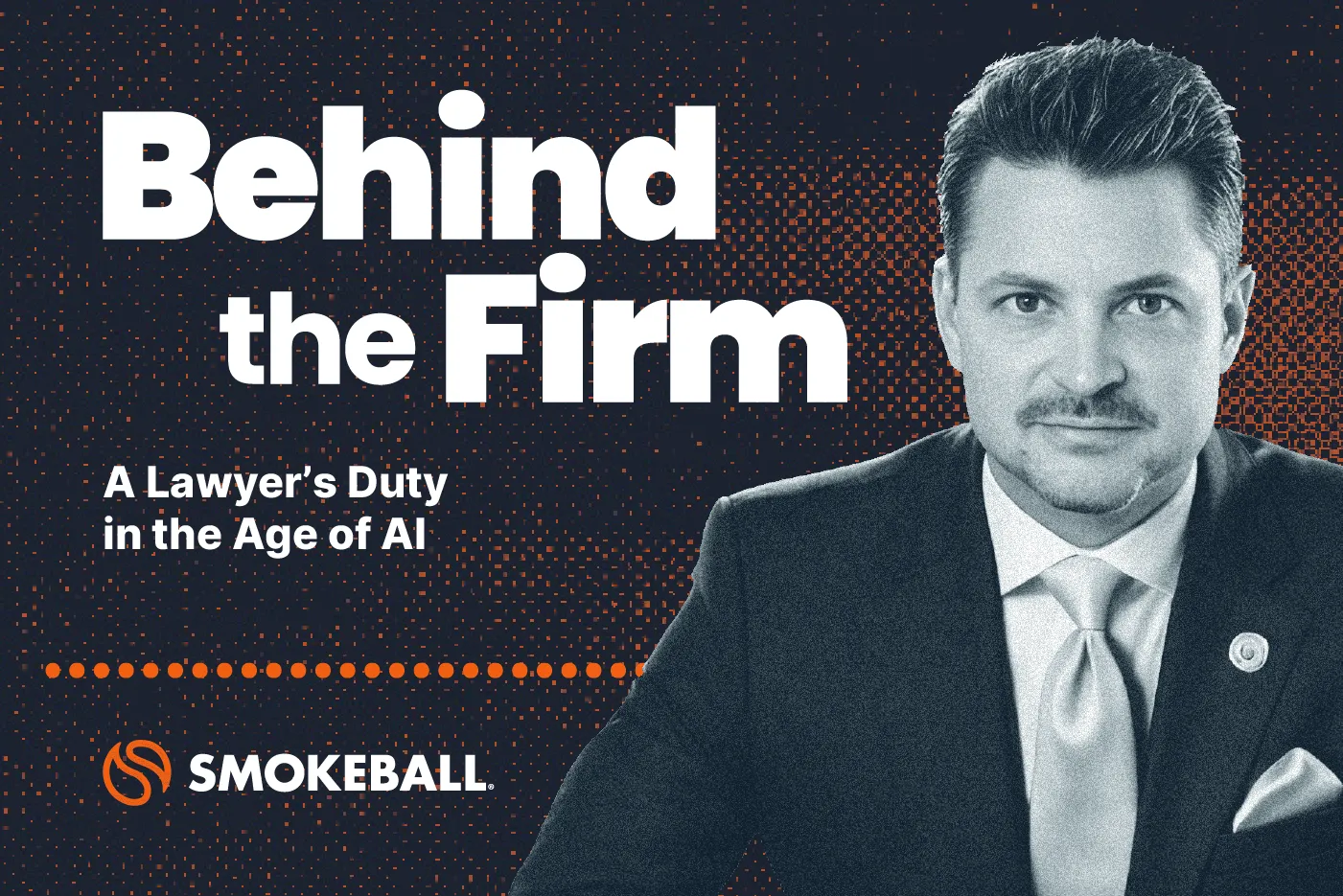ABA Guidance on Ethical Use of AI for Lawyers
Written by
|
November 20, 2024
Written by Smokeball
|
November 20, 2024

Written by Jordan Turk
|
November 20, 2024

The American Bar Association issued Formal Opinion 512 to provide guidance on the ethical use of AI for lawyers.
Since the general release of ChatGPT in 2022, the groundbreaking capabilities of generative artificial intelligence (GenAI) have captured the attention — and concern — of legal professionals across the country. The technology powered by GenAI holds the potential to significantly enhance law firm efficiencies in areas such as document management, data analysis, and client interactions.
However, the GenAI movement has thus far been limited in scope for attorneys, characterized more by individual users embracing the technology rather than widespread implementation at the firm level. For providers of legal services, this transformative technology presents both challenges and opportunities. Even though the influence of GenAI is growing, there’s been a lack of formal guidance regarding AI for lawyers — until recently.

Enter: The American Bar Association
The American Bar Association (ABA) was created in 1878 to establish a legal and ethical foundation for the United States. Today, it stands as the largest voluntary organization of legal professionals globally. Serving as the national representative of the legal field, the ABA is dedicated to enhancing the administration of justice, supporting initiatives that aid lawyers and judges in their duties, accrediting law schools, offering continuing legal education, and fostering public awareness about the significance of the rule of law worldwide. In addition, it issues ethical opinions and guidance on pertinent legal issues.
Opinion 512 on AI for Lawyers
On July 29, 2024, the American Bar Association Standing Committee on Ethics and Professional Responsibility issued its preliminary list of recommendations, known as Formal Opinion 512. This guidance addresses the increasing use of GenAI within the legal profession, backed by the belief that existing model rules concerning competency, informed consent, confidentiality, and fees should continue to be applied.
The Standing Committee specifically emphasizes in its assessment that, "GenAI tools that produce new text are prediction tools that generate a statistically probable output when prompted. To accomplish this, these tools analyze large amounts of digital text culled from the internet or proprietary data sources. Some GenAI tools are described as self-learning, meaning they will learn from themselves as they cull more data."
According to the ABA, attorneys using GenAI tools must thoroughly evaluate their relevant ethical responsibilities to safeguard their clients. These obligations include delivering competent legal representation, protecting client confidentiality, maintaining effective communication with clients, overseeing their staff and representatives, pursuing only valid claims and arguments, upholding honesty before the court, and imposing reasonable fees.

The American Bar Association Model Rules of Professional Conduct
The 15-page opinion explicitly indicated that attorneys must be aware of various rules featured within the ABA Model Rules of Professional Conduct (MRPC). The MRPC is a collection of commentaries regarding the ethical and professional obligations of legal practitioners in the United States. While the MRPC itself does not constitute enforceable law, it serves as a framework for state regulatory bodies, such as bar associations, to implement, allowing for state-specific modifications.
All fifty states, along with the District of Columbia, have established legal ethics regulations that are, in part, derived from the MRPC. What’s more, individuals aspiring to join nearly any state bar must prove their understanding of the MRPC by attaining a satisfactory score on the Multistate Professional Responsibility Examination. The model rules focus on four key areas, including competence, confidentiality, communication, and cost.
Competence
The Standing Committee maintains that “lawyers need not become GenAI experts. Rather, lawyers must have a reasonable understanding of the capabilities and limitations of the specific GenAI technology that the lawyer might use.” Given the rapid evolution of legal AI tools, it’s essential to recognize that “this is not a static undertaking,” and attorneys should continue expanding their understanding of the tools, whether through personal inquiry or the assistance of knowledgeable individuals.
The ABA also cautions against depending on content generated by GenAI because such tools “cannot replace the judgment and experience” that lawyers must apply to their cases. Doing so would make otherwise respectable attorneys particularly vulnerable to sharing inaccurate legal advice or misleading representations.
As technology continues to advance, it’s likely that lawyers will eventually want to use new legal AI tools to competently do their jobs. This model rule also emphasizes that lawyers must understand "the advantages and potential drawbacks" linked to the using technologies in providing legal services to their clients.
Confidentiality of Information
Regarding confidentiality, attorneys are obligated to assess the risks associated with the potential disclosure or access of information by individuals outside the firm when using GenAI — as well as the possibility that such information may be accessed by individuals within the firm who may not secure its confidentiality.
The model rule declares that the varying capabilities of GenAI tools to protect information require a risk analysis that should be “fact-driven and depend on the client, the matter, the task, and the GenAI tool used to perform it.” It also expresses significant concern regarding GenAI and confidentiality, particularly with self-learning legal AI tools, which inherently increase the risk of improper disclosure of information related to a client's representation.
Due to this uncertainty, it’s important that a lawyer obtains the client's informed consent prior to entering any information pertaining to the representation. To mitigate the risk of infringing upon the ABA's confidentiality regulations, it’s essential for all attorneys to familiarize themselves with the Terms of Use, privacy policies, and associated contractual agreements of any GenAI tool they use. Additionally, seeking guidance from a colleague or an external expert who has thoroughly reviewed these terms and policies is advisable.
Communications
This model rule on client communication relates to the obligation of lawyers to maintain communication with their clients and is founded on the legal responsibilities of lawyers as fiduciaries. This includes the requirement for an attorney to promptly inform the client whenever there is pertinent information that the client needs to be aware of.
Opinion 512 clearly indicates that “if asked by a client how they conducted their work, or whether GenAI technologies were employed in doing so, or if the client expressly requires disclosure under the terms of the engagement agreement or the client’s outside counsel guidelines, then these legal professionals must answer honestly.”
There are other circumstances under which attorneys must proactively address their use of GenAI even if a client has not yet inquired. For instance, obtaining informed consent is necessary prior to a lawyer entering any information pertinent to the representation. Furthermore, attorneys are obligated to reveal their use of GenAI tools when it comes to justifying their attorney's fees.

Costs and Fees
Model Rule 1.5(a) establishes that attorneys may use AI tools to enhance the speed and efficiency of legal services. The ABA further references the principles established in Formal Opinion 93-379 concerning the billing of GenAI work as an expense: “The goal should be solely to compensate the lawyer fully for time reasonably expended, an approach that if followed will not take advantage of the client.”
They also stipulate that disbursements, out-of-pocket expenses, or additional charges must be reasonable. In accordance with Model Rule 1.5(a), the following factors should be evaluated in determining if a fee is reasonable:
- the time and labor required, the novelty and difficulty of the questions involved, and the skill requisite to perform the legal service properly
- the likelihood, if apparent to the client, that the acceptance of the particular employment will preclude other employment by the lawyer;
- the fee customarily charged in the locality for similar legal services
- the amount involved and the results obtained
- the time limitations imposed by the client or by the circumstances
- the nature and length of the professional relationship with the client
- the experience, reputation, and ability of the lawyer or lawyers performing the services
- whether the fee is fixed or contingent
Lastly, in the absence of appropriate prior disclosure, Opinion 512 indicates that a lawyer should refrain from charging a client for these costs — and should consider the expenses associated with legal AI tools as overhead.
The Evolving Landscape of Legal AI
The Standing Committee on Ethics and Professional Responsibility has issued substantive recommendations related to how attorneys engage with generative AI. Nevertheless, the ABA recognizes the continuous evolution of GenAI technology and emphasizes that, as its application within the legal sector expands, "lawyers must remain attentive to the Rules of Professional Conduct to guarantee their compliance with ethical obligations."
Smokeball Can Help
Smokeball AI enhances productivity by streamlining various tasks such as information collection, drafting communications, and summarizing cases. Our AI-powered legal practice management software platform efficiently manages your workflows, covering aspects from client intake to case management to billing. Explore how our AI legal software is boosting profits and transforming the operational dynamics of law firms across the country.
If you would like to learn more about our industry-leading legal software solution, we invite you to schedule a no-obligation demo — or you can contact our team directly for personalized assistance.
Learn more about Smokeball document management for law firms:
Book Your Free Demo
Ready to see how Smokeball client intake software helps you Run Your Best Firm? Schedule your free demo!










%20(1).webp)





